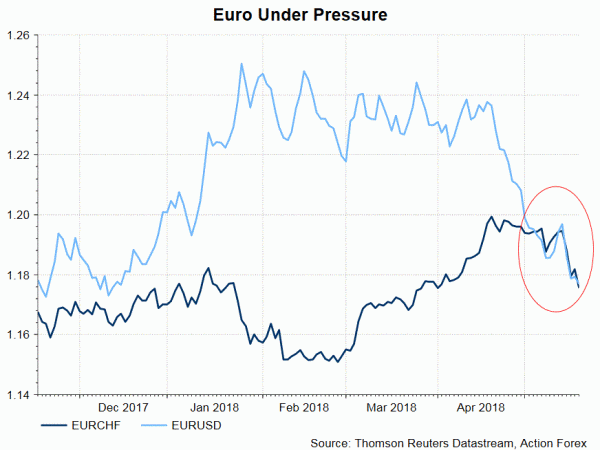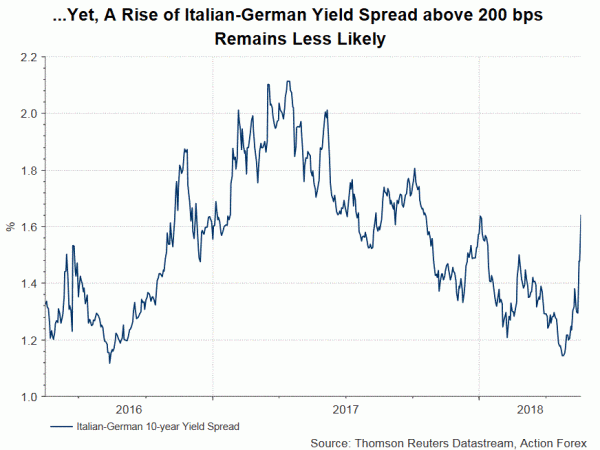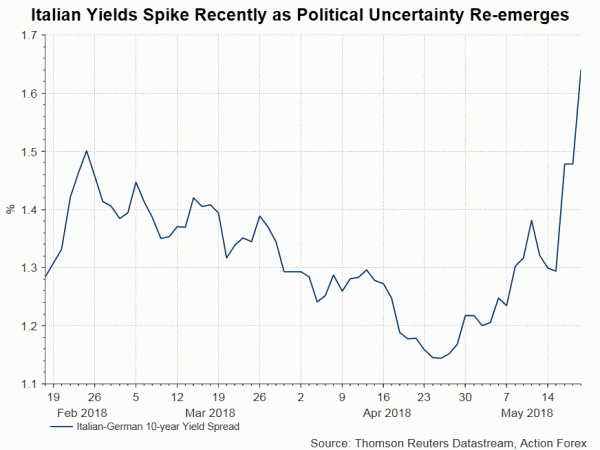Italy’s two populist parties – the anti-establishment Five Star Movement and the far-right League- have agreed on a prime minister candidate, clearing another hurdle to forming a new coalition government. Over the weekend, members of both parties approved the joint economic policy, finalized last Friday, which showed softer stance towards the EU. Yet, it was replaced by a more aggressive fiscal expansion program. The final hurdle would approval by Italian President Sergio Mattarella today (May 21)
The latest version of the economy policy excludes the request for a 250B euro debt relief from the ECB while a mechanism under which countries could leave the EU is not proposed. Yet, it indicates that ECB’s purchase of government under the QE program should not count towards the debt-to-GDP ratio. Meanwhile, it calls for a reevaluation of the EU budget and a review of “European economic governance”, which the parties criticizes as based more on the “predominance of the market” than on economic and social needs. The focus of the plan was on fiscal stimulus. According to former fiscal commissioner and IMF alumnus Cottarelli, the measures might result in a deficit slippage of 108-125B euro (6-7% GDP), in addition to the current 30B euro (1.7% GDP).
| Fiscally expansionary measures | Billion Euro | Fiscally contractionary measures | Billion Euro |
| Income tax cuts | 50 | Reduction of MPs | 0.1 |
| Sterilisation of planned VAT hikes | 12.5 | Cut in high pensions | 0.1 |
| Reduction in oil taxation | 6 | Politicians’ lifelong pensions | 0.1 |
| ‘Universal income’ | 17 | Cut in foreign aid | 0.2 |
| Job centres | 2 | ||
| Early retirements | 5 | ||
| Pension reform | 8.1 | ||
| Policies for families | Up to 17 | ||
| Investments | 6 | ||
| Penitentiary police hires | 0.2 | ||
| Police hires | 0.2 | ||
| Civil indemnities | 1.8 | ||
| Total | 108.7-125.7 | 0.5 |
Source: CPI Observatory
The policy plan, if approved by Italian President Sergio Mattarella, would set the basis for governing for the five-year legislative term. However, Italy’s politics is notorious for the short lifespan of a government. Recalling the election back in March, Five Star Movement emerged as the biggest party securing 265 out of 630 seats in the parliament. Together with the League won 125 seats, the two populist parties have only managed to get a thin majority. Worse still, the relations between the League and its former ally Forza Italia, led by Silvio Berlusconi, have soured recently. It was reported that the strong commitment to combat corruption included in the joint economic policy has displeased Berlusconi. What is foreseeable is that political uncertainty in Italy is far from settling down, as the new government is likely to face strong opposition from both the center-left Democratic Party as well as the center right.
Euro and Yield Spread
The impact of Italian political turmoil on the financial markets has been mainly reflected in the euro and widening in bond yields. The single currency reversed the short-lived recovery against the greenback after the media leaked the draft proposal, which included request of the debt relief mentioned above and other harsh reforms of the EU, of the populist duo last week. EURCHF has also commenced another leg of downtrend with safe haven demand of Swiss franc lifted amidst uncertainty. The tone of anti-EU has been watered down in the final proposal. We also do not expect the new government would pursue a strategy to leave the Eurozone. However, the government, as well as the general public would remain Euro-skeptical so as to get an upper hand on future negotiations. Such sentiment, together with soft economic data in the Eurozone in general, would be negative for the euro in the medium to long term.

Meanwhile, Italian bond yield spreads have widened rapidly of late. 10-year yield spread between Italian and German bonds have spiked to over 160 bps as of May 18, from 129 bps on May 15. The jump has triggered caution of the ECB with Vice President Vitor Constancio indicating last Thursday that the members are monitoring the developing, as “it’s a change from what has been happening recently”. While some have raised concerns about re-emergence of a debt crisis, we believe the case remains remote as Italy’s economy remains in the recovery path. The gradual pick up of economic growth, as well as ECB’s ongoing purchases, should lend confidence to the bond market. A recession is probably a sign of rising risk of a debt crisis.

https://s3-eu-west-1.amazonaws.com/associazionerousseau/documenti/contratto_governo.pdf
http://osservatoriocpi.unicatt.it/cpi-tavola_contrattodigoverno.pdf

